Empowering the future: The rising women workforce in Saudi Arabia’s private sector
On July 25th, the Atlantic Council’s empowerME Initiative, in collaboration with the US Embassy in Riyadh and PepsiCo, held the first workshop in a series of four events for the second cohort of the WIn Fellowship launched in Saudi Arabia. The workshop took place on Tuesday, July 25th, from 12:00-1:00 pm ET/7:00-8:00 pm KSA Time and took place both in-person at The Garage in Riyadh and virtually, focusing on the recent labor market shifts in Saudi Arabia that have facilitated increased women’s participation in the workforce, especially in the private sector.
The event commenced with opening remarks from empowerME’s chairman, Amjad Ahmad. This was followed by keynote speeches from H.R.H. Princess Reema Bint Bandar Al Saud, Ambassador of the Embassy of Saudi Arabia to the United States, and Michael Ratney, Ambassador of the Embassy of the United States to Saudi Arabia.
A panel discussion followed, featuring a line-up of esteemed speakers: Dena Elkhatib, the General Counsel at Riyadh Air, Hattan Ahmed, Entrepreneurship Director at King Abdullah University of Science and Technology (KAUST), Wael Ismail, the Vice President Corporate Affairs – MENA and South East Asia at PepsiCo. The conversation was skillfully moderated by Hanaa Almoaibed, the Vice President for Research at The Arab Institute for Women’s Empowerment.
During the panel discussion, various aspects related to the rising female workforce in Saudi Arabia and its implications for the private sector were explored. The panelists delved into the challenges and opportunities facing women in the workforce, the role of government policy in promoting female employment, and the importance of diversity and inclusion in the workplace. Meaningful insights were shared, shedding light on the transformative impact of women’s increasing presence in the labor force and the positive changes it brings to the private sector.
Key discussion points
The event commenced with inspiring opening remarks by Amjad Ahmad, who shared the fellowship’s vision to significantly increase women’s economic participation in entrepreneurial and leadership roles, ultimately contributing to the region’s overall economic prosperity.
Ahmad highlighted the transformative socio-economic changes underway in Saudi Arabia, driven by its Vision 2030 agenda, with a strong emphasis on women’s empowerment. Over the past five years, the labor force participation rate of Saudi women has risen by an impressive 67 percent, from 21 percent in 2017 to 35 percent in 2022, signaling a supportive shift in government policies.
H.R.H. Princess Reema Bint Bandar Al Saud acknowledged the existing gender disparity in leadership positions, business ownership, and management. Emphasizing the need for change, she stated, “When women succeed, we all succeed.” Her vision includes more women leadership roles, business ownership, mentorship programs, and investment in women-led startups.
The Kingdom’s inclusive Vision 2030 aims to diversify and strengthen the nation’s economy, leading to Saudi Arabia being ranked number one in terms of economic and social progress for women out of 190 economies. This progress is evident in the increasing number of women receiving advanced degrees, enrolling in STEM fields, and owning 40 percent of small and medium-sized startups.
Ambassador Michael Ratney praised the Saudi fellows for embracing entrepreneurship and taking bold steps towards shaping their own future. He emphasized that the fundamental changes driven by Vision 2030 provide opportunities for talents of the Saudi forkforce, especially women, to thrive.
The panelists further discussed the transformation brought about by increased women’s participation in the Saudi Arabian private sector. Dena Elkhatib commented on the remarkable increase of females in the workforce, leading to a shift in workplace dynamics and fostering growth in the private sector.
Hattan Ahmed highlighted the significant impact of female participation on the private sector, evidenced by empirical data. He expressed his excitement for witnessing greater corporate engagement and deployment of women in various areas and industries.
Wael Ismail echoed the ambassador’s remarks, noting the increased access to opportunities for women due to enhanced investment in their education and empowerment.
Ismail elaborated on the benefits of having a diverse workforce in the food and beverage sector, asserting that “the male perspective alone will not allow us to assess how consumers are engaging with foods and beverages.” Therefore, a balanced and inclusive workforce is beneficial, whether in marketing or R&D. Hattan Ahmad added that the concentration of women in STEM at King Abdullah University of Science and Technology (KAUST) is around 39 percent, above the global average, and how they passionately address global challenges like climate change and water issues.
Challenges facing women in Saudi Arabia
During the workshop, Hanaa Almoaibed raised the crucial question of the obstacles women need to overcome in order to sustain the progress achieved. Elkhatib emphasized the importance of women supporting and empowering one another, fostering an environment where different perspectives are valued and heard, promoting collaboration rather than competition.
Wael Ismail built on Elkhatib’s idea, stressing out the importance of creating opportunities and fcultivating a supportive environment for both women and men. While this may pose challenges for some managers, it is vital for fostering a truly inclusive workplace.
Hattan Ahmad shed light on existing disparity in funding, referring to a report from the Boston Consulting Group (BCG). The report revealed that female-founded companies raise an average of a million dollars in funding, significantly less than the two million dollars raised by male-founded companies. However, female-founded companies generate 10% more cumulative revenue their male-founded counterparts, showcasing their capital efficiency and potential for higher return on investment for their investors.
Concluding Notes
In conclusion, the workshop elucidated three central points regarding the future of female empowerment and involvement in Saudi Arabia’s labor force. First, the remarkable surge in women’s labor force participation has sparked catalyzing change within the private sector, leading to creative and efficient work environments without increased unemployment. This success underscores the transformative power of gender inclusion, inspiring further progress.
Second, it is imperative to actively address the disparity in funding and opportunities provided to female entrepreneurs. While the rate of established business ownership among women in Saudi Arabia has increased significantly, reaching 3.7 percent of the female population in Saudi Arabia, compared to just 1.6 percent in 2016, they still face fundraising challenges. A collective effort is needed to encourage more investments into female-founded companies, empowering them to thrive and contribute to the nation’s economic growth.
Lastly, the workplace emphasized the need for greater support and resources for women in the workplace. Research by McKinsey revealed that businesses that fell within the top 25 percent for gender diversity among their executive teams had a 25 percent higher likelihood of outperforming in terms of profitability compared to those in the bottom 25 percent. Female leaders champion flexibility, diversity, equity, and inclusion (DEI) but often face subtle discrimination and biases. By cultivating environments that emplace growth and enacting policies for equal opportunities, we can accelerate progress and foster a more includive and prosperous society, concluded the panelists.
The participants agreed that to sustain the momentum of the progress in Saudi Arabia, continued dialogue and efforts are vital to eliminate remaining obstacles. By shaping a future founded on equality and diversity, Saudi Arabia’s labor force can achieve unparalleled socio-economic growth, with both men and women playing key roles in its success.
Lynn Monzer is the Associate Director with the Atlantic Council’s empowerME initiative at the Rafik Hariri Center for the Middle East.
Nibras Basitkey is the Program Assistant with Atlantic Council’s empowerME initiative at the Rafik Hariri Center for the Middle East.
Related content
Explore the WIn Fellowship
Sponsors


empowerME
empowerME at the Atlantic Council’s Rafik Hariri Center for the Middle East is shaping solutions to empower entrepreneurs, women, and youth and building coalitions of public and private partnerships to drive regional economic integration, prosperity, and job creation.
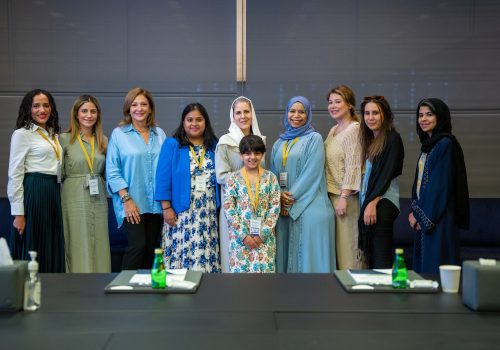
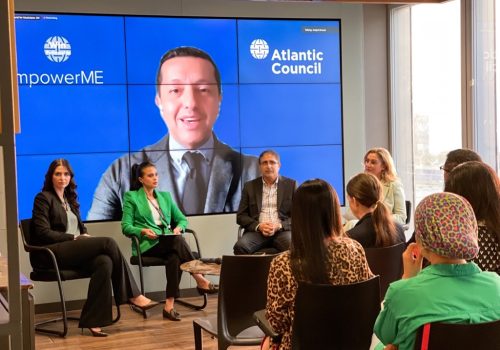
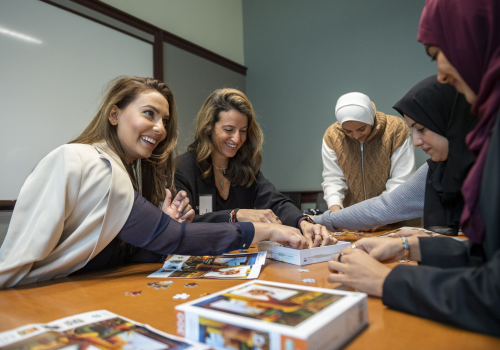
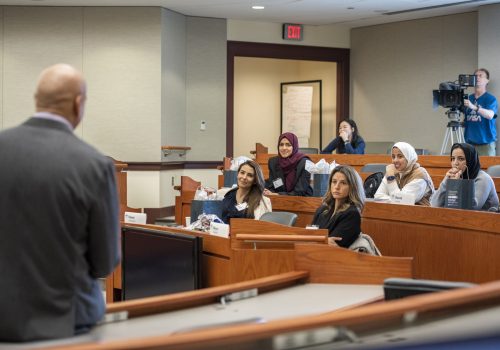
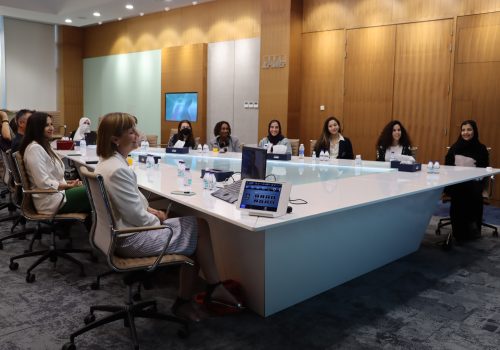
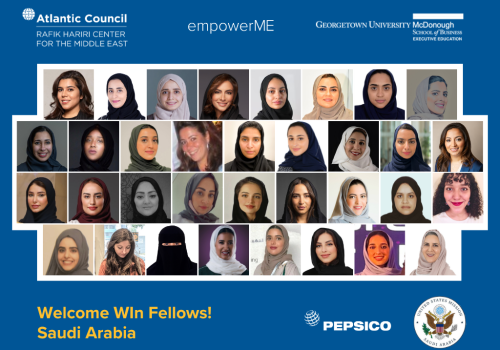
Follow the conversation on social media with @ACMideast and using #ACempowerME